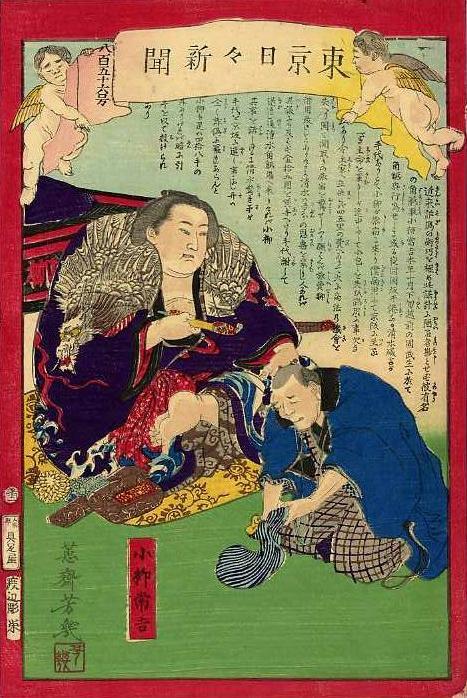Commentary
The red cartouche identifies Koyanagi by name.
Takefushi is now part of Echizen city in Fukui prefecture.
The port of Sakai (Sakai minato) is now the port of Mikuni (Mikuni minato) in Fukui prefecture. A traveler from Sakai would pass through Takefushi on the way to Kyoto or Osaka.
Sumo
sumo grappler, sumo tournament, and sumo site reflect 角觝取 (sumautori > sumōtori), 角觝興行 (sumau kougiyau > sumōgyō) and 角觝場 (sumauba > sumōba).
角觝 means a "locking of horns" -- a metaphor for wrestling as a competition of strength. It is read "kakutei" in Sino-Japanese but is marked in the story to be read "sumau". 角力 (kakuryoku), meaning "horn strength" or a "comparison of strength", is also read "sumau". The usual graphic metaphor for "sumau" today is 相撲 -- which means a "mutual beating" or a "throwing of hands [and bodies] at each other".
"Sumau" reflects "sumafu" -- a Yamato verb meaning "battle" or "resist" so as not to lose. Both variations were reduced to "sumō" in speech that came to inform this present-day form.
The imperfect conjugation of the verb "sumu" (reside) is "suma-", which takes the dubitative aspect marker "-u" (< -fu), to become "sumau" or "sumō" -- meaning "will" or "would" reside. This enables a joke which begins: "How did so-and-so (name your favorite sumo wrestler) propose (to his fiancee or wife)?" -- and ends: "He said 'Issho ni sumō'" -- Let's live [wrestle] together.
